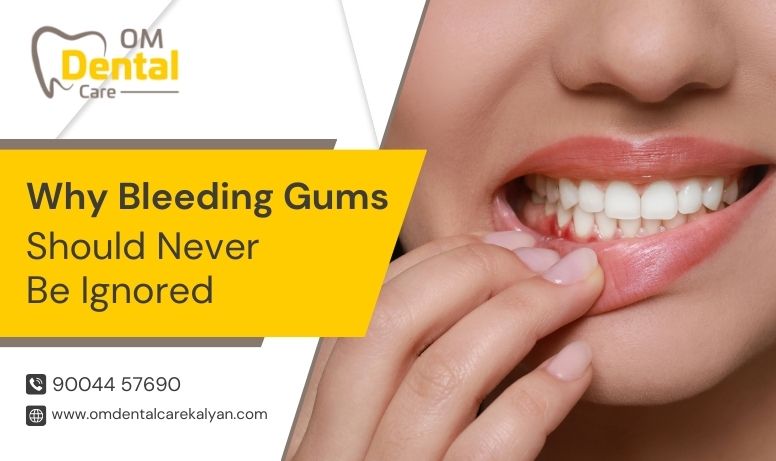
Why Bleeding Gums Should Never Be Ignored
Noticing blood in the sink after brushing can be alarming. Bleeding gums often signal poor gum health and may be an early sign of gum disease.
Ignoring this issue can lead to more serious conditions, so it’s essential to address it promptly.
The most common cause of bleeding gums can be plaque buildup, which leads to gingivitis. However, bleeding gums can also point to other issues such as vitamin deficiencies, hormonal changes, teeth grinding, or even diabetes. Regular Dental Checkups are essential to keep your gums healthy and catch potential issues early. This blog will explore why bleeding gums occur, what they could mean, and how to prevent and treat them.
What Causes Bleeding Gums?
Bleeding gums can happen for various reasons. Here are some common causes:
1. Gingivitis
Gingivitis, the earliest stage of gum disease, is one of the leading causes of bleeding gums. It happens when plaque builds up along the gum line, causing inflammation and sensitivity.
2. Poor Oral Hygiene
Skipping brushing, flossing, or neglecting proper techniques can lead to plaque and tartar buildup, which irritates the gums and causes them to bleed.
3. Vitamin Deficiencies
A lack of essential vitamins like Vitamin C or Vitamin K can weaken your gums, making them more prone to bleeding.
4. Aggressive Brushing
Brushing too hard or using a toothbrush with stiff bristles can damage your gum tissue, leading to bleeding.
5. Hormonal Changes
Pregnancy, puberty, and menopause can cause hormonal fluctuations that increase gum sensitivity and bleeding.
6. Medications
Certain medications, such as blood thinners, can make your gums more prone to bleeding.
7. Smoking
Smoking weakens the immune system, making it harder for your gums to fight infections and stay healthy.
Why You Should Never Ignore Bleeding Gums
Bleeding gums might seem like a minor issue, but they can be a warning sign of more serious problems:
1. Progression to Gum Disease
If left untreated, gingivitis can progress to periodontitis, a severe form of gum disease that can damage the tissues and bones supporting your teeth and lead to tooth loss.
2. Impact on Overall Health
Oral health is closely linked to overall health. Gum disease has been associated with conditions like heart disease, diabetes, and stroke.
3. Chronic Bad Breath
Bleeding gums often accompany bad breath, affecting your confidence and social interactions.
4. Pain and Discomfort
Ignoring the issue could lead to swelling, redness, and pain, making it harder to eat, speak, or smile comfortably.
How to Treat and Prevent Bleeding Gums
The good news is that bleeding gums can be treated and even prevented. Here’s how:
1. Practice Good Oral Hygiene
Brush twice a day with a soft-bristled toothbrush, floss daily, and use an antimicrobial mouthwash to keep your gums clean and healthy.
2. Visit Your Dentist Regularly
Regular Dental Checkups are crucial for detecting and treating gum problems early. Your dentist can clean away plaque and tartar and provide personalized advice.
3. Adopt a Healthy Diet
Eat foods rich in vitamins C and K to strengthen your gums and promote healing. Avoid sugary snacks and drinks that contribute to plaque buildup.
4. Quit Smoking
If you smoke, consider quitting to protect your gums and improve your overall oral health.
5. Be Gentle When Brushing
Switch to a soft-bristled toothbrush and avoid brushing too hard. Gentle, circular motions are more effective and less damaging to your gums.
When to See a Dentist
If your gums bleed frequently or the bleeding persists despite good oral hygiene, it’s time to consult a dentist. Swelling, redness, pain, or bad breath alongside bleeding could indicate a more serious issue requiring professional care.
Bleeding gums may seem like a small problem, but they can be a red flag for bigger oral health concerns. By maintaining good oral hygiene, eating a balanced diet, and scheduling regular Dental Checkups, you can keep your gums healthy and prevent complications.

